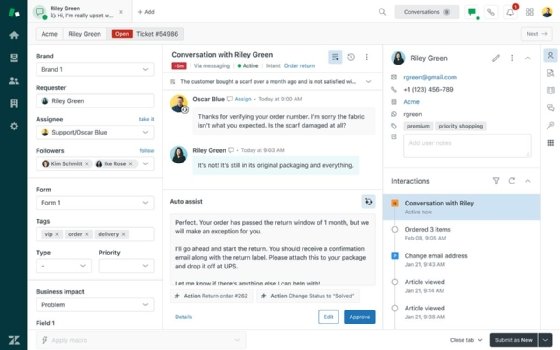
Getty Images/iStockphoto
Zendesk upends pricing for AI in customer service
As it embeds generative AI into its customer service and employee service platform, Zendesk tries a novel idea: outcomes-based pricing based on tickets resolved.
NEW YORK -- Today, Zendesk released numerous generative AI features embedded in its customer service and employee service platform, including voice recognition and analysis. The company also turned on outcomes-based pricing, in which customers incur costs only when AI autonomously resolves a ticket.
Included among the features available today, released in conjunction with Zendesk's AI Summit marketing event, are the following:
- Email channel support for generative AI automated conversations.
- A low-code AI agent builder.
- Auto-assist mode that enables AI agents to potentially anticipate customer needs, offer proactive recommendations and take action in a customer conversation.
- Quality assurance tools to monitor AI agents and identify gaps in service.
In the early days of AI, Zendesk and other AI-driven customer experience platform vendors will have to win over users' customers, said Shelly Kramer, an analyst at TheCube Research.
"As a consumer, the appeal of completely automated interactions is limited," Kramer said. "That, of course, is based upon years of frustrating interactions with bots and automated features that rarely provide satisfactory outcomes. Believing that this fully automated approach is going to make my experiences better is something I can't help but take with a grain of salt."
That said, Kramer continued, agent builder capabilities, CRM integrations and voice analytics -- all of which Zendesk added to the platform -- are foundational for best-in-class CX players. Features like these enable users to deliver faster, more personalized service while solving increasingly complex customer problems.

Previewed and available in early access is voice support for generative AI, which the company says will enable AI agents to solve problems over the phone autonomously. Other features that come with it will enable call monitoring and measurement of typical human call metrics, such as call type, time to answer, wait time and customer abandonment of calls.
Zendesk users embrace AI in the contact center because it can help agents solve chronic problems caused by understaffing and overwhelm of calls about simple problems that can be solved with automation, said Jon Aniano, senior vice president of product for CRM applications at Zendesk. Right now, the typical Zendesk customer solves 20% of tickets with AI and 80% with humans; the company's goal is to flip that to 80% AI and 20% human.
"There are some skeptical people out there, but I would say, by and large, our customers are coming to us saying, 'We believe that generative AI-powered tools can help us hit business outcomes, automate service, help our agents be more productive and give us some insight into the business,'" Aniano said.
Zendesk's novel pricing model
The generative AI features come just weeks after the company's switch to outcomes-based pricing; users will now tie generative AI service technology investments to tickets resolved, like it or not.
Customers, Aniano said, have been generally receptive to the novel pricing model, which does not charge when a customer inquiry is elevated to a human. Zendesk claims its AI agents have been trained on 19 billion tickets, which makes the company confident in its AI's accuracy.
"Brands [sometimes] step up and put their necks on the line for customers, and to me, this is an example of that," Kramer said. "It's a confident move that puts the customer at the center of the equation."
Aniano said Zendesk's pricing based on ticket resolution also builds in flexibility, so when large language models come down in prices, so will Zendesk costs. That is part of the model.
"Today, whether it's OpenAI, Anthropic, Meta, Gemini from Google, new models are coming out, and you know they're better, faster and cheaper," he said. "We expect better performance and better prices from the economics of running LLM infrastructure -- and we can pass that savings on to our customers as we figure out how to align the value to the pricing."
Don Fluckinger is a senior news writer for TechTarget Editorial. He covers customer experience, digital experience management and end-user computing. Got a tip? Email him.






